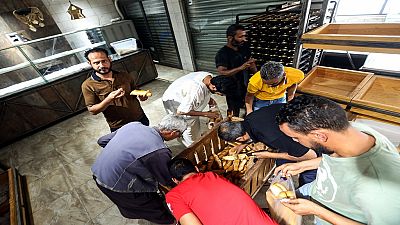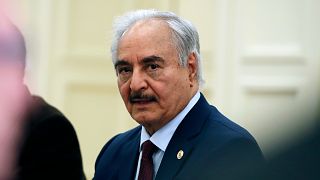Libya
UNHCR, the UN Refugee Agency, and the World Food Programme, WFP, are joining forces in Libya in a project that will aim to reach up to 10,000 food insecure refugees and asylum seekers with emergency food aid this year.
The partnership was launched in recognition of the severe socio-economic impacts of the COVID-19 pandemic in Libya as well as the effects of the ongoing conflict. Nutritious food supports a healthy immune system, which is even more critical in challenging times like these.
Regular food support helps to meet this basic need and allows for limited income to be used for other needs.
Most refugees and asylum seekers in Libya have been unable to find any daily work to support themselves as curfews have been introduced and food prices and the cost of basic goods have dramatically risen.
The cost of a minimum expenditure food basket that would meet basic needs has increased by 24 percent since March. Many refugees say that they are only able to afford to eat one meal a day.
A quick needs assessment conducted by WFP between 30 May to 3 June 2020, carried out via telephone interviews with 10 percent of refugees proposed for assistance, found that on average, one out of two respondents had poor or borderline poor food consumption.
A majority showed significantly higher frequency of using negative coping strategies such as reducing the number of meals per day or limiting the size of meal portions.
In the past 30 days, 77 percent of respondents could not access supermarkets, and 70 percent had no money to buy food.
“WFP is excited to kickstart this food support in Libya to refugees, especially at the time when they are facing a lot of problems regarding coronavirus restrictions. Those people are looking for humanitarian assistance for the basic needs. This joint initiative with the UNHCR is targeting 2000 beneficiaries,” said WFP’s Sufyan Alashab.
“This type of assistance is really vital right now because prices are food needs are going up, especially for those particularly vulnerable people, for those newly released from detention centres or the refugees in urban settings facing severe challenges in accessing their food”
Among those who will be assisted under the project are refugees and asylum seekers recently- released from detention centres, with limited means of supporting themselves. Others will include refugees in urban settings facing severe challenges in accessing food.
One of those getting help as the distributions got underway was Sudanese refugee mother of two, Halima Abudrrahman, who was cradling her two month-old baby daughter.
“This assistance is good. Now, if we are hungry, we get to eat. Its good, its better than before. Because of Corona, we have been eating one meal a day.
We can’t afford to buy the meat we see at the butcher’s, nor can we afford fruit. Life was very difficult. But now, thank God for this help, its better.”
“This help will be a lifeline for many vulnerable asylum seekers and refugees”, said UNHCR Libya’s deputy chief of mission, Djamal Zamoum.
“Most of them, tell us that work has dried up for them because of the COVID related movement restrictions. They have been struggling to feed themselves and family members. Also, UNHCR continues to promote alternatives to arbitrary detention and its very important that whenever the authorities decide to release asylum seekers and refugees from detention, we can show that we are able to assist them in the urban settings.”
The first distribution of food assistance began this week at UNHCR’s registration centre in Serraj. Some 2,000 refugees and asylum seekers will be reached in the pilot phase.
The programme will gradually scale up to reach 10,000 food insecure refugees and asylum seekers this year. The micronutrient-dense ready-to-eat emergency food packages, providing enough food for one month, include hummus, canned beans, canned tuna, halawa, and date bars which cover 53 percent of the daily caloric requirement of a healthy person (around 1,100 kilocalories).
WFP and UNHCR staff will distribute the food packages through to the end of the year, ensuring COVID-19 precautionary measures, such as personal protection equipment, social distancing, disinfection and enhanced crowd controls, are in place for the distributions.
This innovative partnership will also go beyond emergency food support, extending to communications and vital connections. The WFP-led Emergency Telecommunications Sector will be providing connectivity services to a UNHCR Community Day Centre in Tripoli to help refugees connect to their loved ones and communities.













Go to video
Reports of US plans to deport migrants to Libya spotlight rights abuses
00:53
Libya: UN calls for investigation into reports of prison torture
01:30
Migrants 'murdered, tortured and raped' in Libya - UN experts
01:42
Libya: Migrants demand deportation to a safe place
01:10
Amnesty slams Libya, Europe over ‘horrific’ abuse of migrants
01:08
Libyans react after lawmakers approves unity government